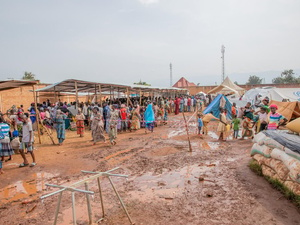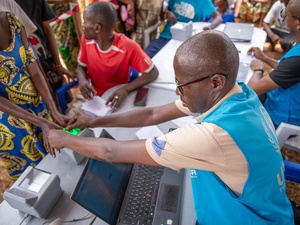Spreading the joy of football in refugee camps across Tanzania

Spreading the joy of football in refugee camps across Tanzania
“Sport has the power to inspire and unite people. In Africa, football enjoys great popularity and has a particular place in the hearts of people.”
Nelson Mandela
KIGOMA, Tanzania - Francois’ favourite sport requires just a rectangular field, a round rubber object, 11 persons in each of two teams running around the field, a pair of posts at each end of the field and maybe shoes… Some call it football; others call it soccer. Whatever you call it, whether you wear shoes or play barefoot, the legend of football is known for centuries as the game that unites the world.
For enthusiasts like Francois, a football league in the Kigoma refugee camps sponsored by the Union of European Football Associations (UEFA) and US auto manufacturer, Chevrolet, was the ultimate gesture of recognition, akin to last year’s Olympic milestone, when history finally took a favorable turn for a category of citizens who until then had been marginalized historically, albeit inadvertently.
Ten promising young athletes—exiled from war torn countries—stepped into the arena of Rio de Janeiro’s Maracana Stadium, and the world saw, for the first time, refugees compete in the 2016 Olympic Games. It was a true testament that sport is integral part of refugees’ lives.

Portia Bagaza a student at Wits University in South Africa, engages with her peers at the Department of Social Development's National Youth Camp in 2016, about being a refugee.
Away from the Olympic limelight a multitude of exiled citizens, scattered across the globe, lacked opportunities to pursue meaningful educational or economic activity, let alone develop their athletic prowess. Still, by whatever means possible, refugees find ways to practice their sporting skills and entertain themselves.
In Tanzania, the UEFA- and Chevrolet-sponsored football league was part of an effort to foster peaceful co-existence between refugees in the Kigoma camps and host communities. Competing teams received prizes, including supplies of high quality Chevrolet-branded One World Futbols—a breakthrough in technology, as the world’s first and only ultra-durable soccer ball that never needs a pump or goes flat, even when punctured. The balls are being used in programs that provide education, teach essential life skills and promote the practice of conflict resolution among youth living in disadvantaged areas all over the world.
Sport is an easy way to bring communities together and foster peaceful co-existence.

Portia Bagaza a student at Wits University in South Africa, engages with her peers at the Department of Social Development's National Youth Camp in 2016, about being a refugee.
The urgency of such interventions in the Kigoma camps cannot be overrated. Conditions are crowded as government and humanitarian partners struggle to provide basic social services, protect children, and tackle sexual and gender-based violence among other priorities. Land shortages and rising numbers of new arrivals have created acute pressures for a country that has taken in over 220,000 Burundian refugees, and recorded an arrival rate in January of almost 600 daily.
Against this backdrop, sport provides a welcome distraction for refugee youth like Francois, who might otherwise be overwhelmed by the day-to-day anxieties that accompany forced displacement and uncertainty about the future. The 23 year-old fled Burundi in 2015 at the peak of insecurity and instability. He traveled on foot for several days before reaching the Tanzanian border. His heartbreaking story includes losing a close friend in the violence.

Portia Bagaza a student at Wits University in South Africa, engages with her peers at the Department of Social Development's National Youth Camp in 2016, about being a refugee.
Like many youths in the Kigoma refugee camps, Francois left his family members and loved ones behind. He reminisces with unmistakable nostalgia about the things he has been forced to do without. “I miss my family and my friends,” he says. “I also miss my favorite meals. Here in the camp we have limited type of food. Plus, I have no means to earn an income.”
Being a refugee has put Francois’ life in a state of virtual limbo. The prospect of peace and stability in Burundi—which would make it possible to return home—has receded in the face of stalled peace talks. In Tanzania, his dream of completing his education is on hold. As a refugee, he cannot receive tertiary education and other public services, which are only available outside of refugee camps. Therefore, he makes the best of his predicament by participating in recreational activities to pass time productively while hoping for a sustainable solution.
The prospect of peace and stability in Burundi—which would make it possible to return home—has receded in the face of stalled peace talks.
At six feet tall, Francois participates in many youth groups in the refugee camp. He is famous as the team captain of the strongest refugee football team. He recently brought his team to win the final against the host community’s football team at a friendly match. “I train everyday with my teammates here,” he says. “I made so many friends in the camp through football. It is the only thing I really look forward to,” he adds.
Sport is Francois’ strategy for survival, and a means to engage positively with his peers in the refugee camp and among the host community. His dream is to become a professional player. He breaks into a smile. “My favorite team is Barca,” he says. “One day I wish to be like Lionel Messi, he is my idol,” Then his expression turns solemn. “I also dream of continuing my education one day.”
He adds pensively that he does not know if that will ever be possible.









